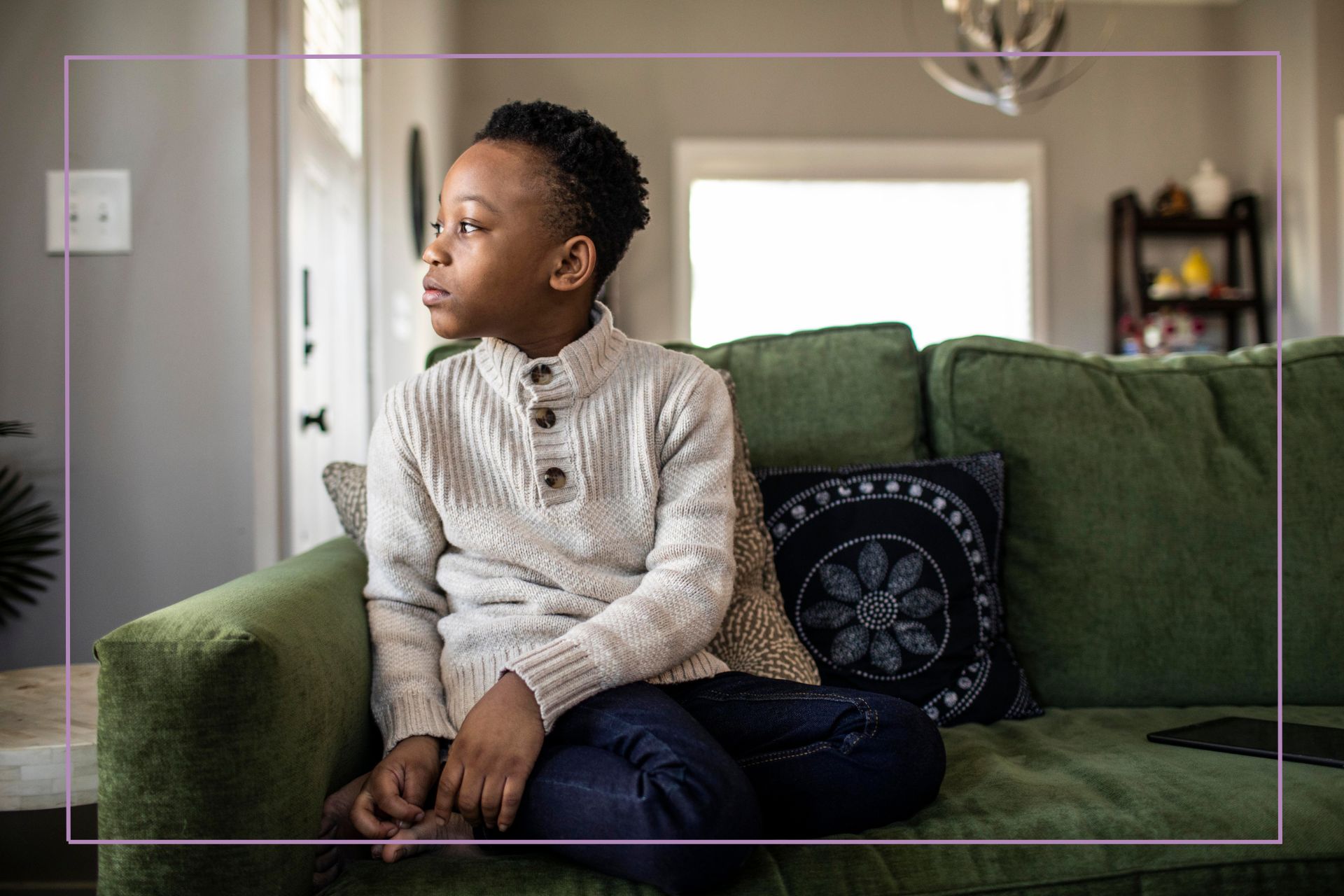Does your child have back-to-school anxiety? Psychotherapist shares this one game-changing word that could help (and our family editor swears by it too)
Ease the back-to-school blues with these expert tips


- 1. Go easy on the kids (and yourself)
- 2. Don’t push too hard for a routine
- 3. Remind yourself that how you feel is normal
- 4. Mindfulness and meditation
- 5. Do something you enjoy on Sunday
- 6. Replace the ‘what if’ and ‘why’ questions with ‘how’?
- 7. Try simple breathing techniques
- 8. Give your kids a sense of autonomy and control
- 9. Don’t counter each anxiety your child expresses
- 10. Don’t minimise their worry
- 11. Don’t try and fix it
- 12. Find age-appropriate supports
When any school break comes to an end many children (and parents) may feel anxious about the routine change. You're not alone in this, we speak to a range of family psychologists to get their insight on how to handle this ahead of going back to school.
There are strategies you can put in place with your kids ahead of going back to school, such as mindfulness activities and learning - as the adult - how to start conversations about anxiety as it's something we can all relate to. According to research, an incredible two-thirds of Brits suffer from the ‘Sunday Scaries’, a term that’s used to refer to the Sunday night dread that so many people experience before going back to school or work after the weekend.
I remember that sense of impending doom in the pit of my stomach as a child, triggered by the theme tune for The Bill on TV on a Sunday evening, signalling that the weekend was over. And now I’m the mother of two boys, aged 10 and 7, I see first-hand what an upsetting and worrying time it can be. And, according to the experts, I’m not alone.
'[school] holidays tend to offer the relaxing of usual schooling routines, homework, and an agenda over which they have little control,’ explains Anna Mathur, psychotherapist, mother, and author. ‘.... [and the holidays] can feel like a lifetime to a young child, and the familiarity of school can feel like a distant memory. Most children will be moving classes, navigating new learning expectations, and potentially a mix-up of classmates, meaning that the return to school can feel daunting. Perhaps playdates and clubs have consisted of chosen friends or smaller groups, and so going back to school with a full class of potentially tricky friendship dynamics can feel like a step outside of the comfort zone.’

Anna Mathur is a mum of three, psychotherapist, and bestselling author. She's passionate about taking therapy out of the therapy room and sharing her own personal and professional experiences to support mums through motherhood. Her latest book, Raising a Happier Mother, How to Find Balance, Feel Good, and See Your Children Flourish as a Result, will be published on 31st August 2023 (Penguin Life).
1. Go easy on the kids (and yourself)
‘Changes, transitions, new environments, and new social groups make most adults feel a little stressed and anxious, but usually given time we become acclimatised and things start to feel more normal,’ says parenting coach Isobel Mary Champion.
‘This is the same for children, and this might show in seemingly unrelated ways such as disruptions to their sleeping and eating patterns, or being a little more emotional and clingy than normal. Try to give them a little extra care and attention if possible. The same goes for you. You might need a little extra support and emotional care from friends or relatives as you and your child approach this hurdle together.’
2. Don’t push too hard for a routine
‘For children starting a new class in September it will probably take them until around half term to settle in,’ Isobel explains. ‘And for those starting a new school, it will probably take until January. Don't try to push too hard for a strict before-and-after school routine straight away. You can perfect this once they have settled in.’
3. Remind yourself that how you feel is normal
Chartered psychologist, Dr Jill Williams, from Uptrained Brain (part of Rethink Therapy) says that reminding ourselves that these symptoms are normal is important.
Parenting advice, hot topics, best buys and family finance tips delivered straight to your inbox.
‘I often talk of the balance between acceptance and improvement,’ she explains. ‘If you’re someone that gets physical symptoms of anxiety - a churning stomach, and racing heart and thoughts - then watch your internal talk about this. If, in your head, you’re saying, ‘Why aren’t I coping better, I should be able to, everyone else can, or What if I have a panic attack or can’t sleep before work…’ then you can see how this just fuels the fire. Instead, remind yourself that these physical symptoms are a normal (if unpleasant) part of the human experience, they don’t necessarily mean anything.
'Any negative thoughts that arise, remind yourself that these are just thoughts, not facts, and you don’t necessarily have to jump to wrestle with them, solve them or block them just because they popped into your head. Acceptance like this can be very powerful.’

4. Mindfulness and meditation
‘Practising mindfulness meditation can be helpful to stop those negative thoughts racing away from you,’ adds Dr Jill Williams. ‘You can now easily find apps or books or check out local courses or mindfulness therapists. (Just don’t expect to be good at it straight away, it is a training process and it takes practise!)’
5. Do something you enjoy on Sunday
‘If you are someone that often feels quite agitated on Sunday evening then include something physical to help reduce that nervous energy,’ suggests Dr Jill Williams. ‘We tend to find routines calming and children especially benefit from consistency, so give some thought to whether your Sunday could be better structured.’
6. Replace the ‘what if’ and ‘why’ questions with ‘how’?
Grownups can suffer from the Sunday scaries too. If you find yourself suffering from a bout of back-to-school blues, it can help to reframe the way you think. ‘When worrying we often focus on ‘What if?’ or ‘Why?’ questions, that are about hypothetical situations or that we’ll never actually get clear answers to,’ explains Dr Jill Williams.
‘Try to replace them with ‘How’ questions – these encourage practical problem-solving. E.g., instead of ‘Why aren’t I on top of my workload?’ you could instead consider ‘How can I prioritise my workload in a realistic way?’ or ‘How can I communicate that this is unrealistic?’. This also focuses your mind on what you can change - always a good strategy! If there’s something you can act on then try to schedule it and act on it ASAP during the week, this helps you feel back in control.’
7. Try simple breathing techniques
‘Simple breathing techniques to help calm a child's nervous systems can be really powerful,’ explains Anna Mathur. ‘Hold up your two hands and encourage them to ‘blow the candles out’ by taking ten deep inhales and extended exhales as you drop one finger each time to signify that they’ve blown a candle out.’
8. Give your kids a sense of autonomy and control
‘Consider what might give children a sense of autonomy and control,’ suggests Anna Mathur. ‘Perhaps the afterschool snack you bring for them or a reminder of what familiar face will be welcoming them at the school gate. Talk about friends they’ve missed over the holidays. This is not about quashing anxiety, but about bringing some balance to it.’
9. Don’t counter each anxiety your child expresses
‘Whilst it can be tempting to counter each anxiety your child expresses, listen to and hear their expression of nervousness,’ says Anna Mathur. ‘It IS nerve-wracking, and remember how we, as children, would have felt the same. Instead of using ‘but’ such as ‘you’re nervous but it will be fine’, use the term ‘and’ instead. Eg ‘you’re nervous, I understand how that feels. And I also know that you’ve done big, scary-feeling things before and you’ve done so well. It will take time, and it will feel normal again’.
GoodtoKnow family editor, Stephanie Lowe agrees; "I started switching out 'but' for 'and' when I was dealing with big feelings with my five-year-old and I saw a real change in how he reacted to it. It's a way of validating his feelings while reassuring him that this is a normal thing to feel."
10. Don’t minimise their worry
‘It is genuinely hard to go back to school,’ explains Ryan Lowe, Clinical Director, The Therapeutic Consultants. ’School is anxiety-provoking for many kids at the moment, both academically and socially. Don’t minimise their worry, but let them know that even though it is hard, they can do it anyway.’
This is a sentiment echoed by Olivia Edwards, The Positive Parent Coach®️ :‘It’s vital we validate our child’s feelings rather than dismiss them,’ she explains. ‘This might sound obvious but a lot of parents can fall into the trap of telling their child there is nothing to worry about (because they want to reassure them) but the message this sends to the child is that the way they feel isn’t valid. This can have detrimental long-term impacts that go way beyond addressing the initial fear in the first place.’
11. Don’t try and fix it
'We are so good at problem-solving, it is pretty much part of being a parent and lots of parents can solve multiple problems at the same time because of how well practiced we are!’ explains Olivia Edwards. ‘But our children often don’t want to problem-solve when we try to offer it. They need time to feel supported and heard before their brains can get into ‘fix it mode’. Some children also struggle with being told what to do which can add to their anxious feelings even more, so finding a way to enable them to come up with a solution when you get round to the fixing is your best option.’
12. Find age-appropriate supports
‘Find age-appropriate supports for a child who feels anxious about going to school,' suggests Ryan Lowe. ‘For younger kids, it might be to take a toy into school, for older kids it might be a treat for a packed lunch or something you made together in the holidays.’
We have lots more back-to-school content, and don't miss Teachers reveal the best ways to get your children back-to-school ready – and why you should never pack their bags for them and check out Confessions from parents about what they’re most looking forward to once the kids go back to school.

Rachel Tompkins is a freelance journalist and mother of two. She has over twenty years of experience as a writer with a wealth of knowledge and expertise when it comes to all things family, health, and lifestyle.